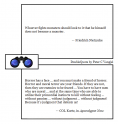A DoubleQuote from Peter C Vangjel
[ by Charles Cameron — Col Kurtz meets Frederick Nietzsche ]
.
Peter Vangjel tweeted a DoubleQuote yesterday, and I’ve now formatted it and am reposting it here:
**
I’m always happy to see that others find the DoubleQuote concept serviceable.
What are your views on Col. Kurtz? What did Capt. Willard think of him? And Francis Ford Coppola?
And where would you locate the heart of darkness?

zen:
April 8th, 2015 at 3:35 pm
Hi Charles,
.
Kurtz appears in both Joseph Conrad’s novel set in the Belgian Congo as well as Coppola’s Vietnam War tale. In both incarnations, Mr. Kurtz and Colonel Kurtz are the Fallen Man – the aspiring superman who in becoming more than mortal is less than human, the civilized man who knowingly chooses atavistic barbarism.
.
Not sure what Coppola thought of him. The fictional Captain Willard narrated his thoughts about Kurtz but in my interpretation of Apocalypse Now, Willard ultimately had to become Kurtz to stop him.
.
Recently, Major Jim Gant, whose tale was told in American Spartan, had been accused of becoming “Colonel Kurtz” of the Afghan tribes after previously having been lauded as the “Lawrence of Afghanistan”. I think that charge was unfair to Gant and it echoed failed charges leveled by Big Army superiors against SF and COIN advocates in Vietnam.
.
http://chicagoboyz.net/archives/44296.html
.
http://en.wikipedia.org/wiki/Robert_B._Rheault
Charles Cameron:
April 8th, 2015 at 11:52 pm
Hi Zen:
.
Willard is able to step back from the deed, so I don’t see him as becoming Kurtz exactly, although he has to resemble him.
.
Having computer woes, so I won’t linger.
Bob Weimann:
April 9th, 2015 at 2:25 pm
I think Walzer said it best:”For as long as men and women have talked about war, they have talked about it in terms of right and wrong. And for almost as long, some among them have derided such talk, called it a charade, insisted that war lies beyond (or beneath) moral judgment. War is a world apart, where life itself is at stake, where human nature is reduced to its elemental forms, where self-interest and necessity prevail. Here men and women do what they must to save their selves and their communities, and morality and law have no place. Inter arma silent leges: in time of war the law is silent.” — Just and Unjust Wars by Michael Walzer
Charles Cameron:
April 9th, 2015 at 6:06 pm
Great quote, Bob. Thanks.